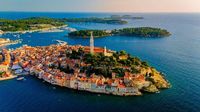As the sun rises over the picturesque Adriatic coast, the beautiful region of Istria in Croatia is facing an unusual challenge: a burgeoning seagull population that is causing chaos for tourists and locals alike. With the summer season approaching, authorities are scrambling to ensure that visitors can enjoy their vacations without being harassed by aggressive gulls.
In 2024, Croatia experienced a notable increase in tourism, welcoming 21.3 million visitors, a four percent rise from the previous year. Istria, known for its stunning coastal towns like Poreč and Rovinj, recorded a staggering 30 million overnight stays, contributing significantly to the tourism revenue of 13.19 billion euros in the first nine months of the year.
However, the idyllic experience of sunbathing and dining by the sea is being overshadowed by a serious seagull problem. Reports indicate that these birds are not only causing noise but are also attacking people and small animals, creating a dangerous environment for both locals and tourists. As one local resident put it, "With food in hand, living here has become perilous. One moment of distraction, and my fish sandwich is gone!"
The Croatian portal dnevnik.hr highlighted the extent of the issue, describing the seagulls as a pest that disrupts the peace and tranquility of Istria. In response, local authorities have launched a campaign to combat the aggressive birds, which includes a rather unconventional strategy: replacing real seagull eggs in nests with fake ones. This method aims to reduce the seagull population in urban areas, particularly in Pula, which has become a focal point for these efforts.
Saša Dobrić, who is involved in the egg replacement initiative, explained, "In a nest, there are usually two to three eggs. We replace these eggs and check thoroughly to ensure we haven't overlooked any nests, as the gulls can be quite clever in hiding them." The plan is to replace about 2,000 eggs over the next four weeks, starting in Pula and extending to other urban areas in Istria.
The breeding season, which peaks in April and May, exacerbates the problem, as seagulls become increasingly territorial and aggressive. The noise and chaos they create can be overwhelming, making it difficult for visitors to enjoy the natural beauty of the area. In fact, past data has shown that this egg replacement strategy has successfully driven out approximately 30 percent of the seagulls from urban environments in previous years.
Despite a slight decrease in the seagull population in recent years, their numbers remain excessively high, particularly in Istria, Rijeka, and the Kvarner region. The seagulls are drawn to urban areas in search of food, nesting close to human habitation, which only increases the likelihood of conflict.
As the summer season approaches, the stakes are high for local businesses that rely on tourism. The fear is that if the seagull problem is not addressed, it could deter visitors, impacting the local economy. Tourists often come to Istria for its beautiful beaches, rich history, and delectable cuisine, but the prospect of being attacked by seagulls could sour their experience.
In addition to the egg replacement strategy, local officials are exploring other measures to mitigate the seagull problem. These include public awareness campaigns to educate tourists about securing their food and avoiding attracting the birds. "We want our visitors to enjoy their time here without the fear of losing their meals to a swooping gull," said a local tourism representative.
The situation has sparked discussions among residents about the balance between wildlife conservation and human safety. Some locals argue that while seagulls are a natural part of the ecosystem, their aggressive behavior must be managed to protect both people and pets. Others advocate for more humane solutions, emphasizing the need to coexist with nature rather than resorting to drastic measures.
As the campaign to replace seagull eggs unfolds, the hope is that it will lead to a safer and more enjoyable environment for everyone in Istria. Local authorities are committed to finding a solution that works for both the community and the wildlife, ensuring that the region remains a top destination for tourists.
With the summer season just around the corner, the pressure is on to resolve the seagull crisis. As preparations continue, both residents and visitors alike are watching closely to see if these measures will restore the peace and enjoyment that Istria is known for. The idyllic beaches and charming towns are waiting, and the hope is that they can once again be enjoyed without the unwelcome presence of aggressive seagulls.





